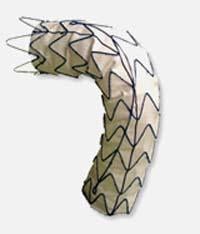
Aortic dissection is rare, but when it occurs, a patient’s prognosis can be poor, even with timely medical diagnosis and treatment. It is the most frequently diagnosed lethal condition of the aorta. In the past, a type A dissection had been treated with surgery and a type B dissection with drugs to lower blood pressure and heart rate. Another option, thoracic endovascular aortic repair (TEVAR), where a stent-graft is placed inside the aorta, was introduced in 1999. This procedure restores the normal aortic anatomy to prevent aortic expansion or rupture.
A study in the April issue of the Journal of Endovascular Therapy evaluates the performance of a specific stent-graft, the Relay thoracic stent-graft, made by Bolton Medical SL. Ninety-one patients who had received this treatment were identified from the Relay Endovascular Registry for Thoracic Disease (RESTORE) database—a multicenter clinical registry in Europe where the Relay stents are currently available. Study subjects were followed for two years after the procedure.
The current study included 69 men and 22 women with a mean age of 65 years who underwent TEVAR using a Relay stent-graft. The technical success rate was 95 percent. The 30-day mortality rate was 8 percent. Over the long term, an 82 percent survival rate was seen in the 2-year period following the procedure.
Seventy-six participants in the Relay study population had type B dissections. Long-term survival has been a particular challenge for patients with type B dissections. The two-year survival rate for type B patients in this study was 84 percent.
Among the risks of TEVAR are stroke and spinal cord injury. A 4 percent occurrence of paraplegia and a low 2 percent incidence of stroke were found in this study sample. These numbers are comparable with several other studies involving larger populations of patients and other stent-grafts.
The authors conclude that “the combination of Relay’s features, such as high stent conformability, low stent radial force, smooth and atraumatic design, controlled deployment, and fixation by its proximal capture mechanism, suggest that TEVAR using Relay devices is a feasible and safe procedure for the endovascular treatment of aortic dissections, including acute and chronic type B dissections.”
For more information:www.jevtonline.org/doi/full/10.1583/10-3233MR.1


 January 05, 2026
January 05, 2026 









